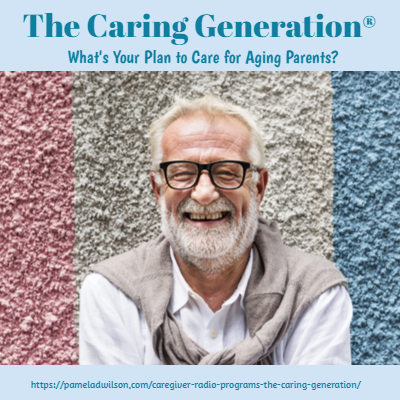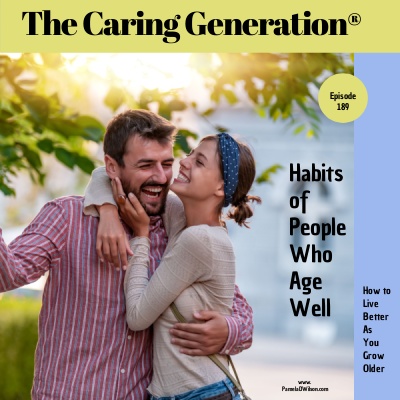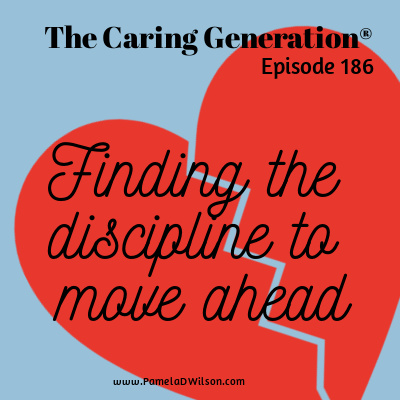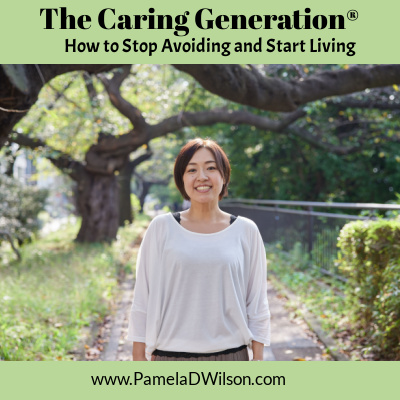How To Plan For Aging Parents

Are you wondering how to plan for aging parents? If you’re reading this, you may be trying to figure out the next steps you should take to care for elderly parents. Or you may be helping a friend or family member by providing resources.
Either way, these tips and resources for family caregivers can help you care for your parent, spouse, or loved one. The information is offered in a multi-media event format with a video, a podcast, and an article to make it easy to get information the way you want.
Why Planning for Aging and Health Doesn’t Always Happen
While you may be rushing from here to there and feeling time-pressured to make decisions, it’s essential to take a step back to understand why family discussions about aging care don’t happen. For example, your parent may be experiencing increasing health issues, was recently hospitalized, or might be struggling to manage day-to-day activities.
In the Livestream caregiver event video replay below this paragraph (click on the arrow to play the video) Pamela D Wilson shares insights into why individuals don’t plan for aging, how not having a plan can negatively affect family relationships, and actions you can take today for how to plan for aging parents or yourself. Share this article, the video, or the podcast with others you know who might be looking for support.
How to Plan for Aging: You or An Elderly Parent
You can also listen to the Livestream event on this week’s episode of The Caring Generation® – Episode 122, January 26, 2022, by following the instructions below. Caregiving expert and host Pamela talks openly about the challenges families face in discussing care for aging parents. Learn the steps to create positive family relationships so that aging loved ones receive the care they need.
Have a question? Follow and connect with Pamela on her social media channels of Twitter, Linked In, Facebook, Instagram, and YouTube or complete the caregiver survey on her website.
To listen to the caregiving podcast, click on the round yellow play button below. To download the show so that you can listen anywhere and share it with family, friends, and groups, click on the button (the fourth black button from the left) below that looks like a down arrow. Click the heart to go to Pamela’s Spreaker podcast page to like and follow the show. You can also add the podcast app to your cellphone on Apple, Google, and other favorite podcast sites.
Good Health is the Foundation for a Happy and Fulfilling Life
Time invested in activities to support good health is never wasted. Where do you put your time and energy every day? Many of us work, go to school, raise children, or engage in hobbies or other activities. The challenge is that we may not view good health as a goal until the day we are not healthy.
Older adults who find themselves dealing with home care or considering an assisted living community or a nursing home for care may feel like they are losing control over life. While responding to unexpected situations that represent the unknown can be intimidating or frightening, it doesn’t have to be that way.
It’s never too early or too late to begin thinking about health and well-being, even if you already have one or several health diagnoses. Consulting a geriatric physician and a caregiving expert for aging parents and their caregivers can help families identify needs and offer short- and long-term care recommendations.
Establishing Regular Medical Care Means You Get Care When You Need It Most
 If you haven’t established medical care with a doctor’s office, the best time to do this is when you’re healthy. Health doesn’t become problematic until you feel sick.
If you haven’t established medical care with a doctor’s office, the best time to do this is when you’re healthy. Health doesn’t become problematic until you feel sick.
If you don’t have a regular doctor and you become ill, you might go to an emergency clinic on the corner or the hospital emergency room for care.
While emergency medical care can solve an immediate crisis, it doesn’t offer ongoing support to prevent or manage a health diagnosis that may become permanent. While a quick fix may be what you need to return to work, it’s short-term thinking.
Gaps Exist Between Emergency and Regular Medical Care
The gap between hospital care and follow-up care with a primary care physician can help to avoid more care and more expensive care as you age. If you are a young adult, you may be worried about taking time off work to see the doctor.
If working to support yourself or a family is important to you, focusing on your health will allow you to be there for your family. Ignoring a health condition today increases the likelihood that whatever it is–high blood pressure, cholesterol, blood sugar, breathing issues–will have a more significant effect on your day-to-day abilities in the future.
Having one or more chronic diseases increases the likelihood of becoming disabled or unable to work in middle age. You may be surprised to learn that health problems often derail retirement dreams.
Older adults with health concerns experience days of not feeling well. Eventually, the spouse or adult child becomes their caregiver. If you are a caregiver, you may be witnessing a parent’s poor health and realizing all that must be done.
Looking for more on this topic? Listen to the Caring Generation® Podcast Healthcare Issues Faced By Caregivers
Know Your Options to Plan For Aging Parents and Yourself
 We’re not born with caregiver skills. But, like many skills, caring for a person with health concerns is learned. It’s a good idea to investigate and understand available options and costs.
We’re not born with caregiver skills. But, like many skills, caring for a person with health concerns is learned. It’s a good idea to investigate and understand available options and costs.
A plan for aging parents should include financial planning for care costs. In addition, estate planning that provides for appointing an agent under power of attorney is essential.
If parents want to continue independent living in their home, talking about the realities and practicalities of health and needing care is necessary. When caregiving conversations happen before a need, it’s easier to be thoughtful in the approach instead of emotionally reacting in a crisis.
Finding Aging and Caregiver Support
Joining a caregiver support group contacting government agencies like Medicare or your local area agency on aging can be a start to learning about available information so that you can investigate further. Many options exist to learn about preventative healthcare measures and aging care.
You can also schedule a 1:1 eldercare consultation by telephone or virtual call with Pamela D Wilson. Learn more about topics and schedule an eldercare consultation with Pamela.
Challenges working with the healthcare system? Is it difficult to understand what doctors and others are telling you because they use big words or abbreviated terms? Learn about the conversation gaps between the medical system and consumers and what you can do.
Don’t Wait to Have Caregiving Conversations
The best advice is not to wait. While you may be healthy and young today, the reality is that we don’t die because we’re healthy. The percentage of older adults who are healthy and active decreases after the age of 65.
Heart disease, cancer, and COVID are have become the top conditions contributing to the deaths of the elderly. It should be noted that while COVID may be the cause of death other chronic health diseases like obesity and diabetes contribute to poor immune function which makes individuals more susceptible to COVID.
Ongoing health issues prevent many older adults from leaving home. Many become limited in their physical activities because of heart, breathing, injuries, and other chronic health conditions that could have been prevented or better managed.
Imagine what it might feel like to be homebound and unable to leave the four walls of your home—or so exhausted that you can’t stand for 15 minutes at the stove to cook a meal. In addition, physical weakness and poor balance often become a challenge for bathing or showering safely. While these situations seem unimaginable to you today, this is the daily reality of aging individuals with health conditions.
Learning how to plan for aging parents means learning more about what you can do today to live a happy, healthy, and fulfilling life.
Looking for help with caregiving, aging, navigating health, and managing family relationships? Check out Pamela’s Caregiver Resources and Support Page on this website.





